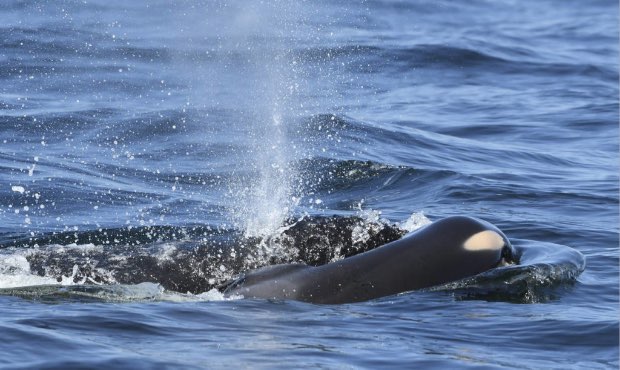forum
library
tutorial
contact

The Orca Task Force
Not to the Rescue
by Pat Neal
Peninsula Daily News, August 15, 2018
|
the film forum library tutorial contact |

|
The Orca Task Force
by Pat Neal
|
These restored Snake River chinook could feed the orcas,
but don't hold your breath.
 The visceral spectacle of the mother orca carrying her dead baby for 17 days and the emaciated female orca that might or might not be missing on any given day has focused the world's attention on their survival.
The visceral spectacle of the mother orca carrying her dead baby for 17 days and the emaciated female orca that might or might not be missing on any given day has focused the world's attention on their survival.
Southern resident orcas have been protected in the U.S. since 1972 under the federal Marine Mammal Protection Act.
This law was a reaction to the common practice at the time of capturing orcas for marine theme parks that resulted in sometimes tragic outcomes for the orcas and their trainers.
This law included an unintended consequences provision that protected harbor seals and sea lions whose exploding populations now compete with the orcas and humans for salmon.
Despite the protection of the Marine Mammal Protection Act the orca population declined by 22 percent in the past 20 years, which has resulted in the orcas being listed as an endangered species.
With the southern resident orca population racing toward extinction, Gov. Jay Inslee signed Executive Order 18-02 designating state agencies to take several immediate actions to benefit southern residents and establishing a task force to develop longer-term action recommendations for the orcas' recovery and future sustainability.
The governor outlined three factors that threaten the orcas' survival: a lack of prey; principally chinook salmon, toxic contaminants and disturbance from vessel noise and traffic.
Unfortunately, there is probably very little we can do about the toxic contaminants entering our water.
Take our own Port Angeles Harbor for example.
The state Department of Ecology has been studying this toxic waterway for 20 years and there is still no plan to clean it up beyond advising us not to eat too much seafood.
As for vessel noise, there are no mufflers on those tankers out in the Strait of Juan de Fuca and Puget Sound.
Suggestions to convert Washington state ferries to the quieter electric motors are expensive long-term solutions that would be too little too late.
This would leave restoring the principle food of the orcas, the chinook salmon.
This is another long shot.
The Puget Sound chinook were also listed as a threatened species 20 years ago.
Since then, billions have been spent buying land from willing sellers, building log jams and planting native vegetation with no corresponding increase in the chinook populations.
Efforts to rebuild chinook stocks for the orcas to feed on with fish hatcheries have been met with lawsuits from environmental groups.
Our list of orca survival tools grows shorter by the minute.
It has been proposed that the removal of the Snake River dams would save the orcas because Snake and Columbia river salmon migrate to Puget Sound to feed.
These restored Snake River chinook could feed the orcas, but don't hold your breath.
Just spilling water over the dams in the springtime to aid the young salmonids' migration to the sea is a tough sell in Eastern Washington.
An April 2 article in the Tri City Herald, "More water to spill over dams starting Tuesday. You'll see the costs on your electric bills," described the backlash of a 9th Circuit U.S. Court of Appeals judge's ruling that more water should be spilled over the dams to aid salmon migration.
The Bonneville Power Administration said this would cost $40 million, which is peanuts to the BPA but too much for them to spend on the orcas.
Last week's column suggesting steps to save the orcas included no longer flushing your toilet or driving your car.
To that I would add stop using electricity.
I think it's the least we can do for these iconic creatures.
That and appoint another task force.
learn more on topics covered in the film
see the video
read the script
learn the songs
discussion forum
